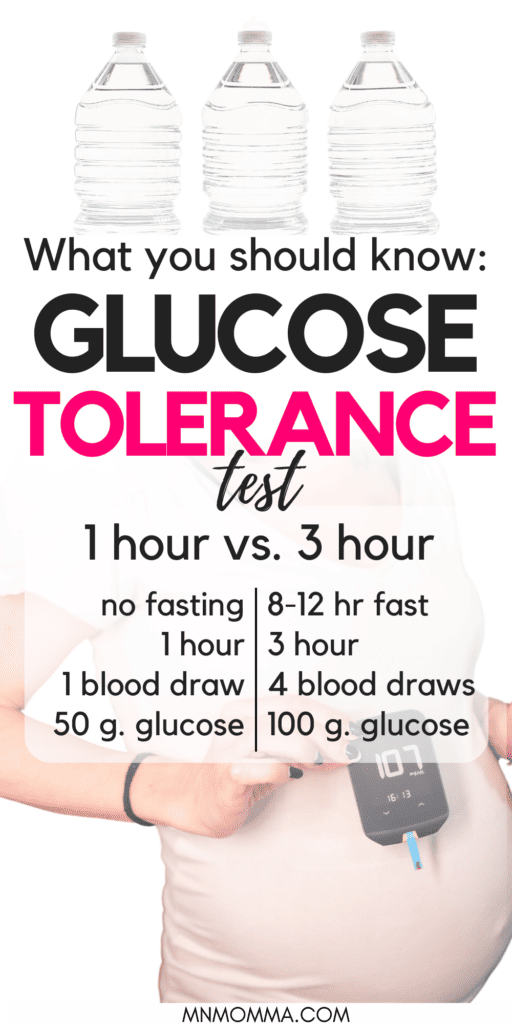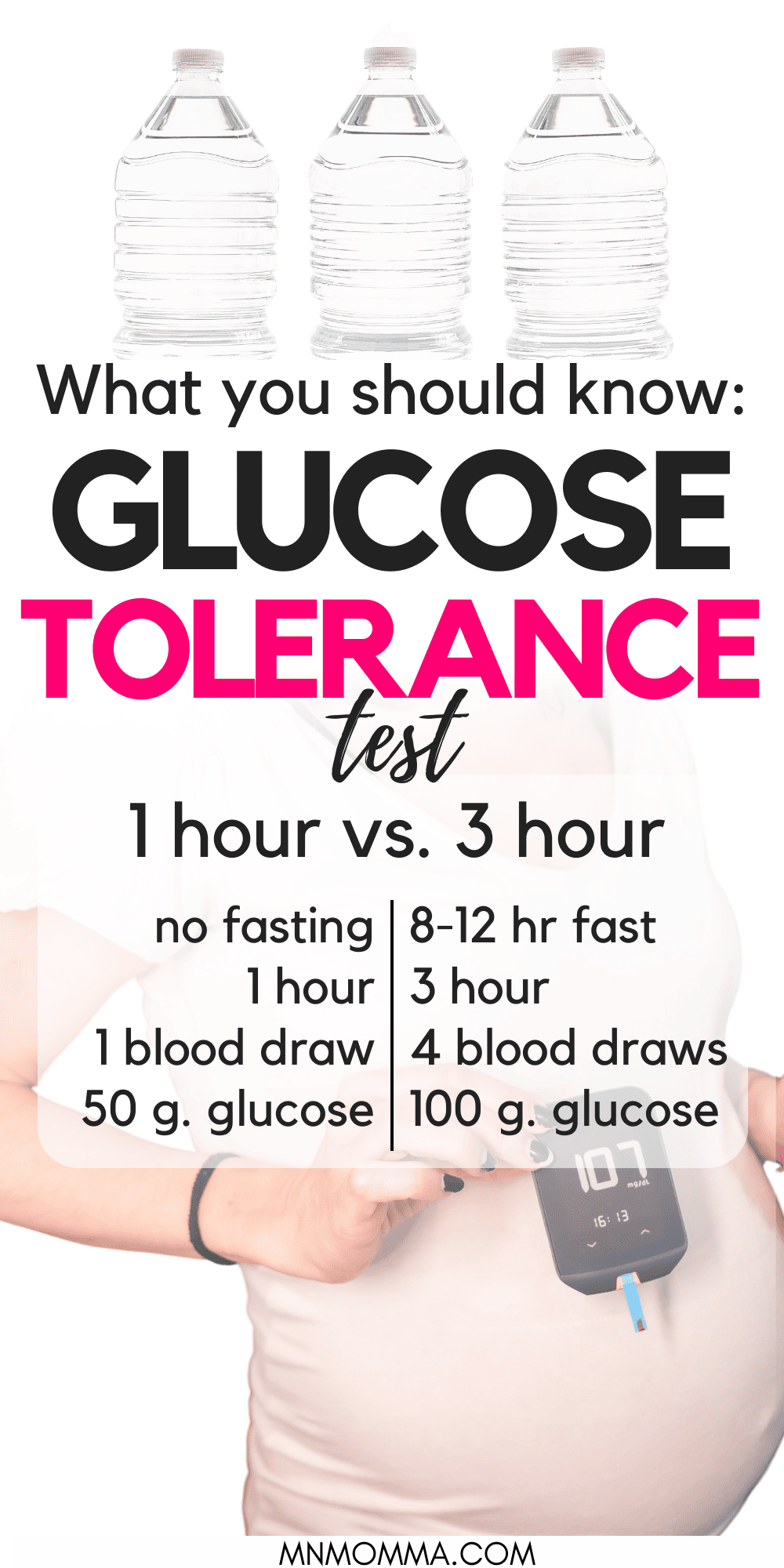How to Pass the Glucose Tolerance Test During Pregnancy
Disclosure: This post may contain affiliate links, which means I may receive a small commission if you click a link and purchase something. Please check out my disclosure policy for more details. All opinions are my own!
Chances are good you made it to this post because you’re finally to the part of pregnancy where your doctor just mentioned the “glucose tolerance test” or the gestational diabetes test.
Annnnd maybe you’re stressing a little bit about it.
As a nurse and mom to three, I’m here to give you all the details on what the glucose tolerance test actually is, why it matters, and how you can pass it and get your levels in normal range.

<— Pin it! Save this post for later!
Why Do Pregnant Women Have To Do the Glucose Tolerance Test (GTT)?
First off, no one HAS to do anything.
You can certainly refuse the glucose tolerance test if you choose, however, there are many reasons that it’s recommended.
Keep in mind that while pregnancy is an amazing thing, it also brings about various changes in a woman’s body.
These changes can include a change in how our bodies manage glucose – a key metric to watch for the safety of your baby during pregnancy.
To determine the body’s ability to regulate blood sugar, healthcare providers often recommend an oral glucose tolerance test (OGTT) for pregnant women so they can determine if you have gestational diabetes.
And if you do…
They can help you find the right resources to manage it for the rest of your pregnancy, which can help keep you and your baby safe.
What Is the Oral Glucose Tolerance Test?
The oral glucose tolerance test is a blood test that helps your doctor (or nurse practitioner or midwife) evaluate how efficiently your body processes glucose.
It’s typically done between 24 to 28 weeks of pregnancy and is used to screen for gestational diabetes mellitus (GDM).
GDM is a condition that causes high blood sugar levels during pregnancy and can lead to complications for both mom and baby if left untreated.
The process of the glucose tolerance test usually involves drinking a sugary drink containing a specific amount of glucose and then getting blood draws to determine your blood sugar levels.
It’s important to follow the instructions given by your healthcare provider and drink the sugary juice/pop within a specific timeframe.
How Do I Prepare for My 1 Hour Glucose Test?
The prep for your glucose test will depend on which test you’re having done, so be sure to listen closely to your doctor’s instructions.
For my 1 hour glucose test, and according to MedLine for most, you do not have to do anything special before the test.
Just eat or drink as you normally would.
However, if you’re coming back for a follow up glucose test, likely called the 3 hour glucose test, you’ll have to follow more strict parameters.
These will probably include:
- Fasting (not eating or drinking) for a specific amount of time (usually somewhere between 8 and 14 hours before your test)
Remember, always ask your provider what you need to do to prep for your upcoming glucose test.

What Happens on the Day of the Glucose Tolerance Test
On the day of your glucose test, you’ll be asked to drink the glucose drink within a set time frame, usually around five minutes. While you probably won’t love the taste, it’s I felt it was tolerable, and you can usually pick which flavor you’d like.
Lemon-lime has been my go to!
Make sure you drink the entire solution, as this will give accurate test results.
Once you’ve finished the glucose solution, you’ll need to remain in the doctor’s office or the testing facility for the designated duration of the test, which can vary depending on the type of test being conducted. There are two main types of glucose tolerance tests: the one-hour test and the three-hour test.
The 1-Hour Glucose Test
The one-hour test involves measuring your blood glucose levels one hour after drinking the glucose solution.
This is usually the one almost all pregnant moms have done first.
For this test, you typically are asked to avoid any physical activity and to rest during the hour. In other words, bring a book and be ready to just hang out. 🙂
The 3-Hour Glucose Test
If the one-hour test results show high blood sugar levels, your healthcare provider may recommend a three-hour glucose tolerance test for a more accurate diagnosis.
During the three-hour test, you’ll still drink 100 grams of glucose (the sugary drink again!), but then you’ll have your blood drawn at regular intervals, usually every hour, to monitor how your body processes glucose over time.
Sips of water are usually allowed, but it’s important to clarify with your doctor or the lab beforehand as drinking too much water can dilute the glucose concentration in your blood and lead to inaccurate results.
This test obviously takes a lot more time that the 1 hour OGTT (oral glucose tolerance test). So bring along something to do while you sit and wait for each of your blood draws.
Getting Your Results
You can usually expect to get your results from the prenatal glucose test within a couple of days. This may vary depending on how big the lab or clinic is that you attend and whether or not they can test your blood onsite or if they need to send it out.
Be sure to ask your doctor if they’ll call about your results either way, or only if your levels come back outside the normal range.

Tips for Passing the Glucose Test In Pregnancy
So now that you know what the glucose test is during pregnancy, what are the best tips for passing the glucose tolerance test?
If you’re anything like me, I was freaking out a little before the GTT with each pregnancy.
I REALLY wanted to pass it and not have to worry about having enough insulin or modifying my diet.
That said, I have some mom of 3 and RN wisdom to share:
- First, just remember it’s not the end of the world if you don’t pass it. It’ll be okay, and your healthcare provider should give you some great tips to manage the rest of your pregnancy and have great success.
- Secondly, you can’t trick the test. As much as I wanted there to be a way, because I am totally Type A and ENJOY passing tests, you really can’t swing the numbers your way if they’re not meant to go your way. Sorry momma, it’ll be what it’ll be.
- Finally, you don’t WANT to trick the test. Accurate results are best for you and baby. Even if you could swing the results to a normal range when you’re not normally in that range, you wouldn’t want to. You want to know where your body is at and what it’s really doing during THIS pregnancy.
Help keep your baby and yourself healthy by letting the results show correctly so you can manage your blood sugars and the rest of your pregnancy safely so you and baby end up as healthy as possible.
So try not to sweat it.

What Can You Do To Have Good Results on Your Prenatal Glucose Test?
That being said, there are a few tips you can start implementing as soon as you find out you’re pregnant to help you pass the glucose test while pregnant.
1. Healthy Diet
First, start by maintaining a healthy diet throughout your pregnancy.
It’s even better if you’ve already started to eat healthy prior to becoming pregnant, but it’s never too late to start, especially with these easy pregnancy superfoods.
Remember that you’re not just feeding yourself anymore, but also nourishing a growing baby.
A balanced diet, rich in complex carbohydrates and low in added sugars, can help regulate blood sugar levels.
Try to eat the recommended variety of fruits, vegetables, whole grains, and lean proteins.
2. Stay Active
I get it.
It can be exhausting to exercise while pregnant.
But regular physical activity is another essential aspect of a healthy pregnancy.
Where you choose to run, walk, bike, swim, or even dance – engaging in moderate exercise, as advised by your healthcare provider, can help control pregnancy weight gain, promote insulin sensitivity, and reduce the risk of gestational diabetes.
Remember, it doesn’t have to be anything crazy, just move your body.
And if you’re looking for extra tips, try the Belly Only Pregnancy class.
Family History & Early Screening
If you are at a higher risk of developing gestational diabetes, your healthcare provider may recommend additional testing or earlier screenings.
The Mayo Clinic lists risk factors that include:
- Being overweight/obese
- Not exercising
- Being diagnosed with pre-diabetes
- Being previously diagnosed with gestational diabetes
- Having polycystic ovary syndrome
- Immediate family member who have diabetes
- Previously having a baby that weighed 9+ pounds (4.1 kilograms)
- Certain race or ethnicities (Black, Hispanic, American Indian and Asian American)
It’s important to remember that a positive result on the glucose tolerance test doesn’t necessarily mean you have gestational diabetes.
Further diagnostic tests, such as the three-hour glucose test, will be conducted to confirm the diagnosis.
What If I’m Diagnosed With Gestational Diabetes?
If you receive a gestational diabetes diagnosis, don’t panic.
Your healthcare provider will work with you to develop a treatment plan tailored to your needs.
This plan may involve monitoring blood sugar levels, making dietary changes, incorporating physical activity, and, in some cases, taking insulin therapy.
Remember, the glucose tolerance test is just one aspect of your overall pregnancy care.
Regular visits to your pregnancy care provider and adhering to their recommendations will help ensure a healthy pregnancy for you and your baby.

Alternatives to the Sugary Drink For the GTT in Pregnancy
While the traditional method of using a sugary drink for the glucose tolerance test (GTT) during pregnancy is commonly practiced, there are alternative options available that can be discussed with your healthcare provider.
These options usually are used as they’re viewed as more natural and easier to consume.
Jelly Beans
One alternative to the sugary drink is to have a specific amount of jelly beans.
I mean, who doesn’t love that?!
This method involves eating a set number of jelly beans that contain a specific amount of sugar equivalent to the glucose drink.
This option may be more appealing to those who have difficulty drinking large amounts of liquid or find the taste of the sugary drink unpleasant.
Glucose Gel
Another alternative is using a glucose gel or bar.
These products are specifically designed to contain the required amount of glucose for the test.
They are usually available in different flavors and can be consumed within a set timeframe, similar to the sugary drink.
This option provides a more convenient and portable option, allowing you to consume it at your convenience.
Will My Doctor Be Okay With An Alternative to the Glucose Drink?
It’s important to note that the availability of these alternatives may vary depending on your healthcare provider and the testing facility.
Discussing these options with your healthcare provider can help you find a suitable alternative that meets your needs and preferences.
It’s crucial to follow the instructions and recommendations provided by your healthcare provider when considering an alternative to the sugary drink for the GTT.
They will guide you on the specific requirements, timing, and consumption guidelines to ensure accurate test results.
The primary goal is to assess your body’s ability to process glucose effectively, and these alternatives aim to provide a more comfortable and manageable experience while still getting accurate results.
FAQ
What stage of pregnancy do you do glucose test?
Have you been wondering what week the 1 hour glucose test happens during pregnancy?
The glucose test, also known as the glucose tolerance test (GTT), is typically conducted between 24 to 28 weeks of pregnancy.
Why then?
This time is chosen because gestational diabetes mellitus (GDM) is more likely to develop during the second trimester of pregnancy.
However, if you have specific risk factors or a history of gestational diabetes, your healthcare provider may recommend conducting the test earlier in your pregnancy.
What are the warning signs of gestational diabetes?
The warning signs of gestational diabetes can vary, and some women may not have any noticeable symptoms.
That said, there are a few signs that may indicate you have gestational diabetes.
Keep in mind, lots of these are also common symptoms of simply being pregnant:
- Increased thirst: Feeling constantly thirsty and needing to drink more fluids than usual.
- Frequent urination: Needing to urinate more frequently, often in larger quantities.
- Fatigue: Feeling excessively tired or lacking energy throughout the day.
- Blurred vision: Experiencing blurry or impaired vision.
- Increased hunger: Feeling constantly hungry or experiencing intense food cravings.
Keep in mind that these symptoms can be attributed to various factors, and experiencing them does not necessarily indicate gestational diabetes.
I mean, most pregnancy women would check off having to pee all the time, feeling extra hungry, and feeling super tired at least a few times during their pregnancy.
That said, if you notice any of these signs, it’s a good idea to chat with your healthcare provider about them.

How can I prevent gestational diabetes naturally?
Preventing gestational diabetes naturally involves adopting healthy lifestyle habits.
Here are some tips:
- Maintain a balanced diet: Focus on consuming a variety of nutrient-dense foods, including fruits, vegetables, whole grains, lean proteins, and healthy fats. Avoid excessive consumption of sugary and processed foods.
- Choose complex carbohydrates: Opt for complex carbohydrates, such as whole grains, legumes, and starchy vegetables, which have a lower impact on blood sugar levels compared to refined carbohydrates.
- Control portion sizes: Be mindful of portion sizes and avoid overeating. It can be helpful to work with a registered dietitian or nutritionist to develop a meal plan that suits your specific needs.
- Engage in regular physical activity: Stay active with exercises that are safe for pregnancy, such as walking, swimming, or prenatal yoga. Aim for at least 30 minutes of moderate-intensity exercise on most days of the week, as recommended by your healthcare provider.
- Manage stress levels: Find healthy ways to cope with stress, such as practicing relaxation techniques, mindfulness, or engaging in activities you enjoy.
- Maintain a healthy weight: Achieve and maintain a healthy weight before and during pregnancy, as excessive weight gain can increase the risk of developing gestational diabetes.
- Stay hydrated: Drink plenty of water throughout the day to stay hydrated and support overall health.

What not to eat the night before a glucose test?
Before a glucose test, it is generally recommended to follow specific instructions provided by your healthcare provider.
These instructions may not not require you to do anything at all or could include fasting for a certain duration.
If you do need to fast, remember to not eat or drink anything, except for water, during the fasting period.
What You Should Know About the Glucose Tolerance Test in Pregnancy
The glucose tolerance test isn’t a test of how good of a mom you’ll be, or even necessarily how well you’ve taken care of your body.
Sure, there are things you can do to reduce your chance of getting it, but even women in the best shape who eat healthy daily, can end up with gestational diabetes.
So do your best not to stress.
By following the guidelines provided by your healthcare provider, maintaining a healthy diet, and staying physically active, you can increase your chances of passing the glucose tolerance test.
And if you don’t pass it?
You can work with your doctor to still enjoy a healthy pregnancy.














